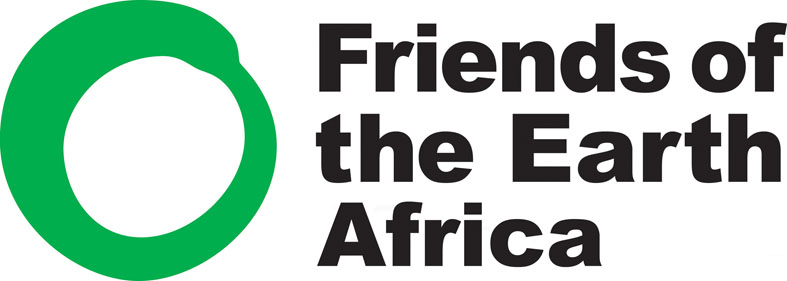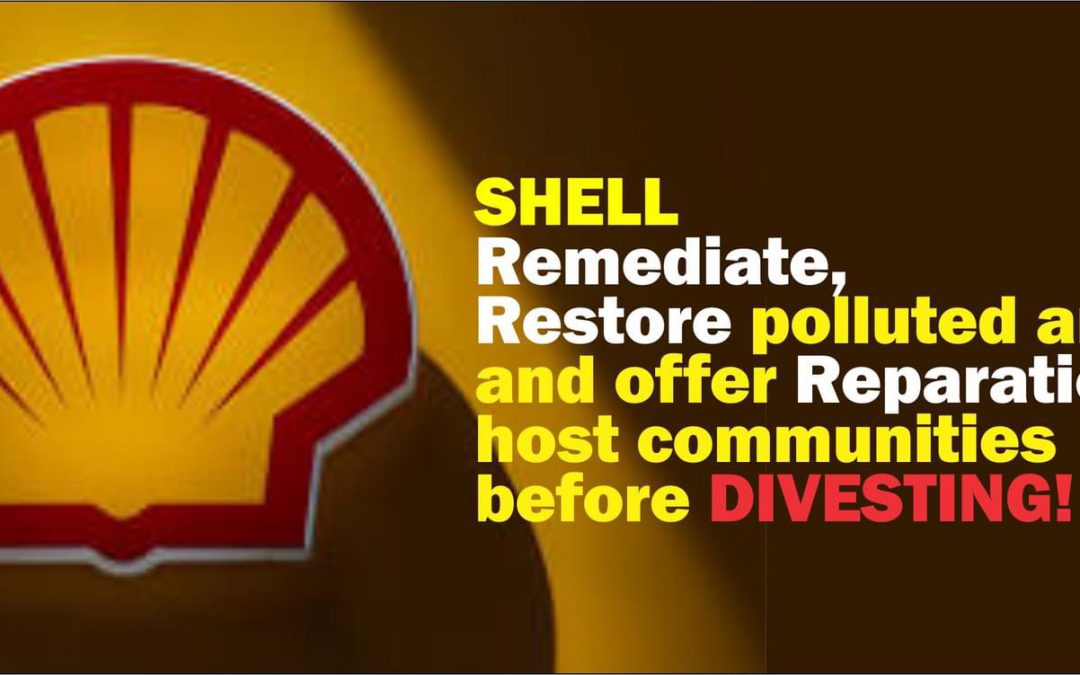
by FoE Africa | Feb 12, 2024 | Uncategorised
The Environmental Rights Action/ Friends of the Earth Nigeria (ERA/FoEN) has called on the Nigerian government to put the brakes on Shell Petroleum Development Company (SPDC) divestment plans and ensure it pays for its environmental crimes in the Niger Delta.
This demand was informed by SPDC’s plans to sell its onshore facilities to a conglomerate of five domestic oil companies.
Shell was the pioneer of Nigeria’s oil and gas exploration since the 1930s, with hundreds of oil spills traced to its operations in host communities that continue to suffer the consequences of pollution to their environment, health, and livelihood.
Executive Director of ERA/FoEN, Barr. Chima Williams faulted Shell for trying to run away from its crimes even with the uproar that has greeted its divestment plans in affected communities and among civil society organizations.
“As an organization that has tracked the activities of multinational oil companies for decades, we insist that the decision of Shell to sell off its onshore facilities to domestic companies and to remain in Nigeria to conduct its business offshore is a deliberate attempt to evade the liabilities the company has incurred over time. “
He also pointed out that Shell should not be allowed to abandon its onshore facilities to domestic companies without cleaning up the damage they have caused to the environment, and the cost to locals who have been impoverished by their business activities.
“These communities who have played host to Shell for decades have been left in abject poverty, with several degrees of damages to their health and environment, while Shell explores their resources to enrich foreign coffers. Shell should not be allowed to sell off its facilities and abandon the liabilities they owe these communities.”
Williams said it would be shameful that the Nigerian government would value its quest for revenue, over the lives and livelihoods of the common people who have suffered from the decades-long environmental pollution caused by Shell.
He called on President Bola Tinubu-led administration to ensure that Shell’s divestment plans are accompanied by full remediation plans in their various communities of operations and full payments of loss and damages to host communities.
He also called for a close evaluation and monitoring of Shell’s offshore operations to checkmate the scope of their activities in order to avert any impending damages to the environment.
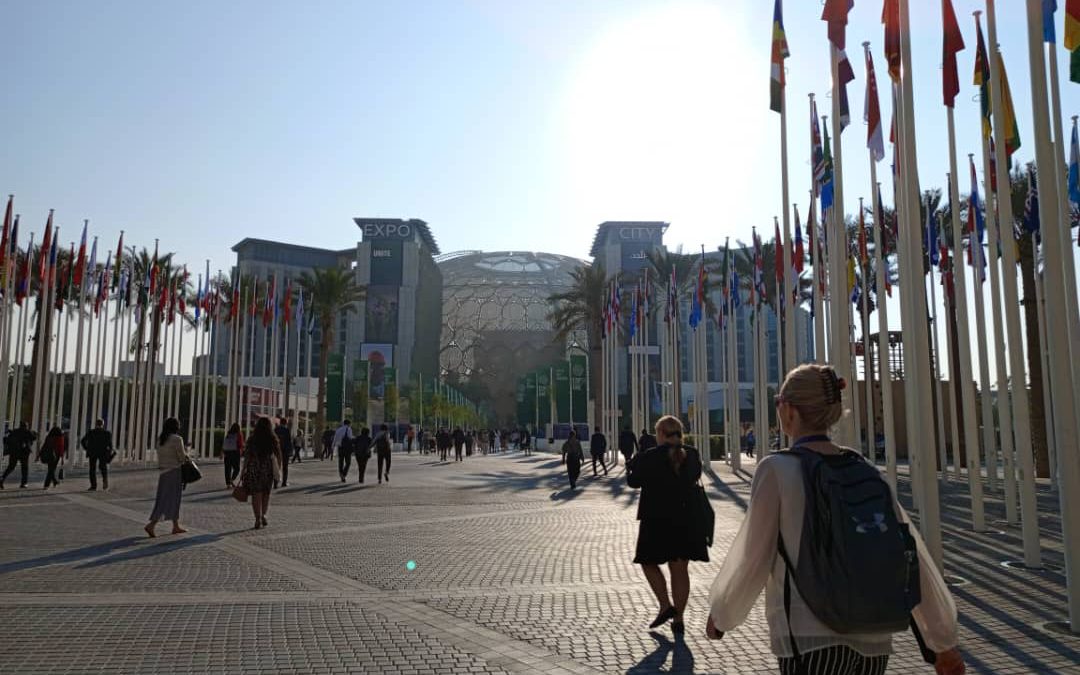
by FoE Africa | Dec 14, 2023 | Uncategorised
Wednesday 13 December 2023, Dubai (United Arab Emirates)
The COP28 outcome fails key tests on the fast, fair, funded and full phase-out of fossil fuels that the world needs now to avert climate catastrophe. As delegates applaud the “UAE Consensus” struck at the 28th UN climate summit, Friends of the Earth Africa and International is dismayed at the enormous loopholes which only serve to prolong the fossil fuel era.
“The COP28 deal has fallen short of delivering meaningful commitments on fossil fuel phaseout and urgently needed climate finance. The deal opens the door to dangerous distractions that will prevent a just and equitable energy transition– carbon capture utilisation and storage, hydrogen, nuclear, carbon removal technologies like geoengineering and schemes that commodify nature. And, there is nothing that would stop hundreds of millions of tonnes of offsets being considered as ‘abatement’,” explained Sara Shaw, FoEI.
The outcome is weak on equity as it does not properly differentiate between developed and developing countries’ role in the transition away from fossil fuels – despite their differing historical responsibility for emissions. It has a global renewable energy target, but no money to make it happen.
“The energy transition cannot be just, equitable, or fair if it isn’t funded. Developed countries who are responsible for historical emissions must not only take the lead in emission reductions but also provide the adequate climate finance that is needed in developing countries. The so-called just transition put on the table here won’t deliver the long-term transformation that is needed in my country Nigeria and across Africa” says Ubrei Joe Maimoni , CJE coordinator for Friends of the Earth Africa.
Sara Shaw deepening the discussion went on to say Developed countries may blame larger developing countries (such as India, China and the COP28 host) for the weakening of the fossil fuel text, but rich countries like the US, UK and EU are the biggest historical polluters, all with huge fossil fuel expansion plans. They have failed to provide adequate climate finance needed for emissions reductions, adaptation, and loss and damage in developing countries – at this summit, and for decades before. They must not posture as climate champions.
The Loss and Damage fund was made operational at the start of COP28, but huge questions remain about its accessibility, given it will be hosted by the World Bank. Pledges made in Dubai fall far below what is needed – just $700 million when, for example, the devastating 2022 Pakistan floods were estimated to have caused $30-40 billion damage.(1)
“As expected, we’ve seen the wealthiest countries shirking their dues at this COP. Without money and means of implementation, the places worst hit by climate change are left with only empty pockets and empty promises. We need trillions of dollars, we’ve been given peanuts, and even more debt to boot,” warned Bareesh Chowdhury, Bangladesh Environmental Lawyers’ Association (FoE Bangladesh).
Over 2400 fossil fuel lobbyists were present at the summit (2), which was characterised by a strong crackdown on peoples’ voices, both inside the UNFCCC and in the national context.(3)
“While COP28 rolled out the red carpet for polluters, activists faced censorship of our calls for just outcomes for people. Climate justice is impossible without respect of human rights, and we will not be silenced, for as long as bombs rain on Gaza and Palestine remains occupied, as long as corporations raze indigenous lands and those in power deem the people on the frontlines of the climate crisis as disposable,” stated Lise Masson, FoEI.
– ends –
Notes:
We are still waiting for an outcome on Article 6 of the Paris Agreement, on carbon markets, and may make further comment.
References:
(1) Figures from the Pakistan Climate Change Council. See article: Flood Losses Now Estimated at $40 Billion: Pakistan Officials https://www.bloomberg.com/news/articles/2022-10-19/flood-losses-now-estimated-at- 40-billion-pakistan-officals-say
(2) Figures from the Kick Big Polluters Out (KBPO) coalition. See press release: Record number of fossil fuel lobbyists at COP28 https://kickbigpollutersout.org/articles/release-record-number-fossil-fuel-lobbyists-atte nd-cop28
(3) While all eyes were on COP28, the host country cracked down on dissidents. See article: UAE holds mass trial as it steps up crackdown on dissent during COP28 https://www.ft.com/content/f9249386-fb39-4786-b43d-f27933475b87

by FoE Africa | Dec 5, 2023 | Uncategorised
For Immediate Release
Friends of the Earth Africa (FoEA), the regional body of the world’s largest grassroots environmental justice organization- Friends of the Earth International, (FoEI), will be meeting with the ECOWAS Parliament on December 7, 2023, to address a matter of utmost importance- the environmental impacts of industrial plantation expansion in West Africa.
Event Overview:
Date: December 7, 2023
Time: 3 pm to 5 pm
Venue: ECOWAS Parliament, International Conference Centre, Area 10, Garki, Abuja. Nigeria.
Subject: FoEA Delegation to Discuss the impacts of industrial plantation in West Africa with ECOWAS Parliament.
Delegation Members: The FoEA delegation includes FoE Africa member organizations, allies, impacted communities, and women from Ghana, Liberia, Nigeria, Sierra Leone, and Togo. These members bring critical insights into the environmental challenges faced by communities in West Africa due to deforestation and land grabbing for industrial plantation expansion.
Key Subjects of Discussion:
It addresses the significant deforestation caused by agro-commodities expansion and its consequences on local ecosystems as well as indigenous peoples and local communities.
Climate Change: Discussing the role of plantation expansion in contributing to climate change and exploring sustainable alternatives like community forest management and agroecology.
Biodiversity Loss: Highlighting the threat to biodiversity loss in West Africa and proposing measures to protect critical ecosystems.
Purpose of the Meeting: The FoEA delegation aims to engage with the relevant committees of the ECOWAS Parliament to:
Share findings on the environmental, social, and economic impacts of industrial plantation expansion in the region.
Discuss the role of ECOWAS member states in regulating and monitoring these expansions to ensure sustainable practices.
Explore potential policy frameworks and legislative measures that can address the negative consequences of industrial plantations.
Media Availability
FoEA representatives will be available for media interviews and questions following the meeting. A press conference is scheduled immediately after the session with the Parliamentarians to provide additional insights and responses to media inquiries.
Media Contacts:
Rita Uwaka, Forest and Biodiversity coordinator, Friends of the Earth Africa and Nigeria
riouwaka@gmail.com
(234) 08034553503
James Otto, Forest and Biodiversity steering group member, Friends of the Earth Africa
jotto@sdiliberia.org
Babawale Obayanju
Communication coordinator
Friends of the Earth Africa
owaleseun@gmail.com
Note to Editors :
Friends of the Earth Africa is a key advocate for social, environmental, and gender justice, representing 9 African member countries striving for a sustainable balance between economic development and environmental responsibility. We look forward to your participation and coverage of this significant event.
Friends of the Earth Africa is a regional chapter of Friends of the Earth International operating in n 74 countries around the world.
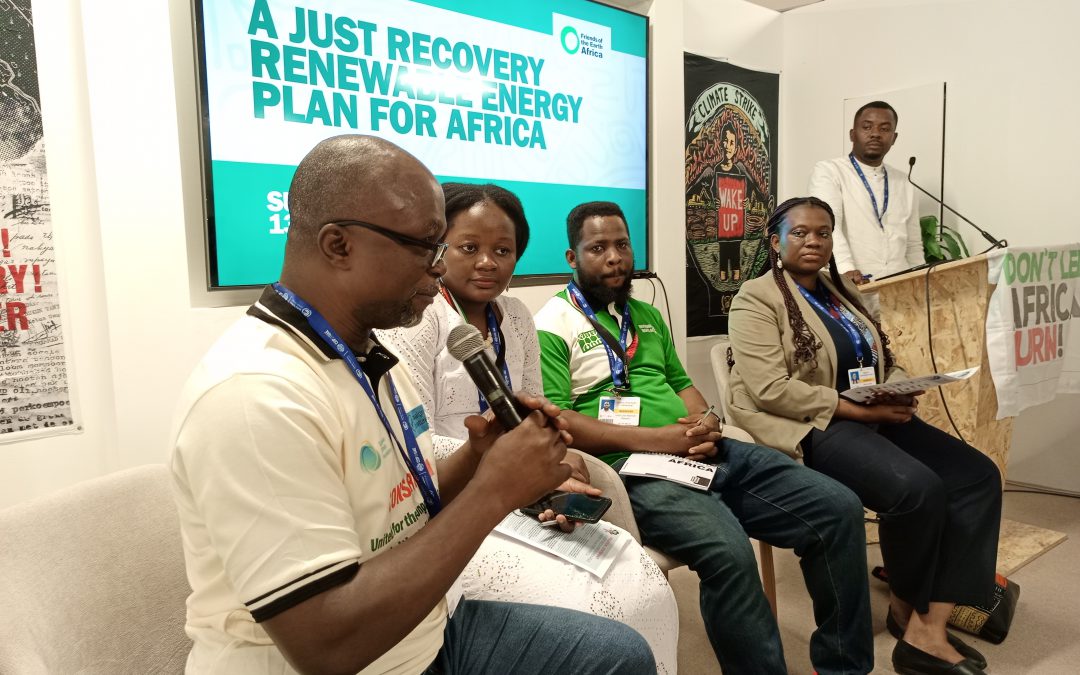
by FoE Africa | Dec 5, 2023 | Uncategorised
A just transition to 100% renewable is possible
That the African continent is suffering from poly crises is no longer news. But of importance at this United Nations Framework Convention on Climate Change COP28 is the climate crisis confronting the continent.
As a result, Friends of the Earth Africa (FoEA) in partnership with Climate Action Network Africa (CAN-Africa) , Africa Coal Network (ACN), Hands of Mother Earth (HOME ) Africa working group against Geoengineering and Environmental Rights Action hosted a side event to review the path to a just transition to 100% renewable energy for Africa.
The event observed that the grave climate change impacts faced by the peoples of the global south especially the African continent that ranges from floods, cyclones, drought, water shortages, desertification, sea level rise, the irreparable and irreplaceable losses and damages and the other indirect impacts such as crude oil spills that have ravaged many communities across Africa, to communal conflicts, and landgrabbing is necessitating this conversation.
Affirming the above, the Intergovernmental panel on climate change (IPCC) have said that if these crisis especially climate crisis is to stop and if we are to limit global average temperature to below 1.5oC above pre industrial levels, we must leave all known fossil fuels underground, phase out not phase down all fossil fuel while transiting equitably, radically and Justly to a new form of energy- clean renewable energy with a shift from the current system of exploitation – hence our quest for system change nor climate change.
In the words of United Nations Secretary general Antonio Guterres on the first day of COP28, – “the world is unequal and divided, bombs are sounding again in Gaza, and climate chaos is fanning the flames of injustice, global heating is bursting budgets, ballooning food prices and upending energy markets and feeding a cost of living crisis, but climate action can flip the switch. We need to be Accelerating a just and equitable transition to renewables. The science is clear; the 1.5°C target is achievable only if we stop the burning of all fossil fuels, a phase out is needed, not reduce, not abate but a phase-out with a clear time frame aligned with 1.5°C. Climate justice is long overdue; developing countries are devastated by disasters they did not cause, extortionate borrowing costs are blocking their national climate action plans and support for developing countries is far too little and far too late. “
Sharing their experiences on a way out of the climate crisis, activists from different parts of Africa spoke up and affirmed that it is urgent for the world to brace up and transition swiftly from dirty energy to renewable energy.
Leading the conversation, Marina Agortimevor, coordinator of ACN stated that if there are barriers to a just transition it means there are opportunities for Africa to engage in other ways to overcome those barriers.
For example, there are about 600 million people, Africans who lack access to electricity – this is an opportunity for Africa considering the huge renewable energy potential of the continent.
Marina pointed out some of the barriers that ACN has identified as possible hindrances to the desired transition to 100% clean renewables as poor access to finance to speed up the transition. She also acknowledged the recently operationalized Loss and Damage Funds here at COP28, and hopes that these funds will be easily accessible by those who need it and will help to reduce this identified gap.
As a trained engineer with hands-on experience of renewable energy, especially solar systems , she raised the need for technology and Knowledge transfer gap to and for Africans to be filled. When this identified gap is filled, we would not be an extraction pot nor would we be a consumer hub but a major player in how we produce energy for Africans and by Africans, she said.
Taking the conversation further Safiatou Nana , regional coordinator of CAN-Africa , spoke on the needs for this transition to embrace a decentralised off grid system which would put management of the energy in the hands of the communities who need and use them. She further emphasised that the transition should consider the cultural context of the over 600 million African peoples who lack access to electricity, and the proper reskilling of workers as important considerations in this process. Collaborations by communities, Civil society organizations and the government, and a good legal framework Nana reiterated would be a boost to the move to 100% renewables.
On his part the Host of the event , Ubrei – Joe Maimoni, the climate Justice and energy lead for FoEA who also doubles as a programme manager for Environmental Rights Action highlighted that without a clearly spelt out policy framework whose goal is measureable, people centred and serve the purpose of the continent with the appropriate budgetary allocations and government support in the form of good political will and transfer of subsidies from the polluting fossil fuels industry to renewables will still be a high hanging fruit process.
He said that we should not allow this transition to be a renewal of energy colonization, and that Africans must be at the center of the pathways to 100% renewables.
There is word out here in Dubai that a decision to triple renewable pledges so we can meet the 100% renewables energy target will be made at this COP28, which posed a question to the peoples in the room , will this pledge light up Africa ? Will it make us another pot of extractions? Or make us a powerhouse of renewable energy tech production? Will this keep us in the loop of consumption and extraction ?
Or will this move us to tech self reliance and equitably just mineral extraction usage?
Josué ARUNA executive director of Congo Basin Conservation Society CBCS network DRC responded to some of the questions raised above, he said aside DRC being a hub where many of the minerals ( now referred to as critical/ strategic/ transition minerals) required for the transition to 100% renewable energy, the government of his country is also been giving out oil blocs to different companies on biodiversity protected zones.
This Josue said is increasing communal clashes, destruction of the ecosystem while the funds being generated is not imparting positively the lives of the people.
The session also examined Article 6 of the Paris Agreement which opens up a window for the adoption of several carbon market schemes and solutions that includes Nature Based Solutions, and several Geoengineering schemes. The panelists emphasized that any solution that does not or will not lead to the cut of emissions at source or keep global average temperatures below the 1.5 o C threshold , lead to massive landgrabbing , colonization of our waters should not be promoted or advanced.
The existing climate change requires a rapid, equitable , just and fair transition to 100% renewables if the world would stay safe from global burning especially Africa and the global south. The time to act is now.
For more information contact :
Babawale obayanju
Communications coordinator
Friends of the Earth Africa.
+2348072051368
owaleseun@gmail.com
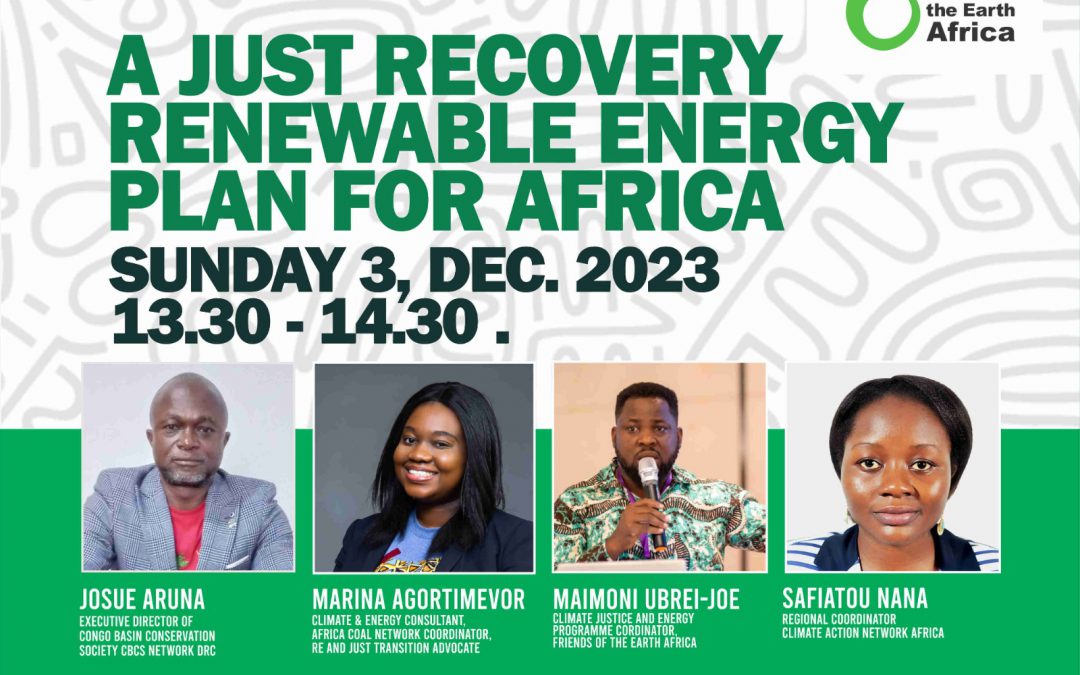
by FoE Africa | Nov 29, 2023 | Uncategorised
Friends of the Earth Africa hosts a wide delegation with spokesperson available from the continent of Africa at the UN climate talks in Dubai, 1–12 December 2023.
There is an urgent need for a radical, fare and just phase out of all fossil fuels if Africa is to remain without burning due to global temperature rise and out planet to stay with global temperature limits.
To this end historical polluters, – many “developed nations” such as the US and Europe, must do their fair share of emissions reductions upholding the principle of common but differentiated responsibility, while providing the needed finance to support a just energy transition, adaptation, and Loss and Damage across the continent of Africa and the global south who suffer from grave impacts of climate induced disasters.
We would join comrades from across the world to stand against many of the proposals being pushed in this global policy space – notably in Article 6 of the Paris Agreement concerning carbon markets – which are false solutions to the climate crisis, and have shown to harm communities and ecosystems while delaying real climate action. These include net zero, nature-based solutions, geoengineering, carbon markets, hydrogen, and carbon capture technologies.
Whilst present in Dubai, we will join our colleagues from the Friends of the Earth International (FoEI) alongside other climate justice movement worldwide, to stand in solidarity with oppressed peoples in the UAE, across the Middle East and the world.
Activities
Thursday 30 November
Press conference: FoEI demands and expectations for COP28
Line-up of speakers from Friends of the Earth groups worldwide
Room: Press 2, Zone B6 – Building 77
Time: 11.00-11.30 (GMT+4)
Sunday 3 December
Event: A Just Recovery Renewable Energy Plan for Africa
Hosted by Friends of the Earth Africa
Room 1, Climate Justice Civil Society Hub, Blue Zone
Time: 13.30 – 14:30 (GMT+4)
Friday 8 December
Press conference: FoEI analysis on week one & expectations for week two
Line-up of speakers from Friends of the Earth groups worldwide
Room: Press 2, Zone B6 – Building 77
Time: 14.00-14.30 (GMT+4)
Saturday 9 December
Photo opportunity: Global Day of Action on Climate Justice
People raise their demands for climate justice through coordinated actions at the COP venue and around the world, all day.
Sunday 10 December
Press conference: Litigation to fight climate change & corporate power
Line-up of speakers from Friends of the Earth groups worldwide
Room: Press 2, Zone B6 – Building 77
Time: 16.00-16.30 (GMT+4)
Monday 11 December
Event: Freeing ourselves from the “net” – Course correcting climate action to Real Zero
Speakers from FoEI, FoE Sri Lanka, Corporate Accountability, Global Forest Coalition, Institute for Socioeconomics Studies
Room: SE Room 3
Time: 16:45-18:15 (GMT+4)
Tuesday 12 December
Press conference: FoEI closing comment on COP28
Line-up of speakers from Friends of the Earth groups worldwide
Room: Press 2, Zone B6 – Building 77
Time: 12.00-12.30 (GMT+4)
Spokespeople & media contacts
Ubrei-Joe Maimoni Climate Justice and Energy Programme coordinator, FoEAfrica maimoni[at]foei.org Whatsapp +2348063894925 In Dubai for week one.
Tyler Booth, Climate justice & energy Coordinator, FoEI
tyler[at]foei.org, Whatsapp/Signal +27 64 654 8464, X @TylerJess38
In Dubai for both weeks, speaks English
Sara Shaw, Climate justice & energy Coordinator, FoEI
sara.shaw[at]foe.co.uk, Whatsapp/Signal +44 79 7400 8270, X @climatemouse
In Dubai second week only, speaks English/Spanish
To arrange interviews, contact: Babawale Obayanju, Communication coordinator, FoEAfrica owaleseun[at]gmail.com Whatsapp +2348072051368 In Dubai from 1-12 Dec.

by FoE Africa | Nov 16, 2023 | Uncategorised
The latest Global Oil and Gas Exit List (GOGEL) just published by Urgewald, tells a damning story of the oil and gas industry, which continues to support new oil and gas projects in the midst of our climate emergency. The updated GOGEL is supported by the Life after Coal Campaign and more than 50 partners from around the world. It is a critically important resource for all those working towards environmental and climate justice around the world.
“With Africa having contributed the least towards global warming yet bearing the most severe impacts of a rapidly changing climate, it is important for civil society here and around the world to have access to updated, well-researched data,” says Bobby Peek, Executive Director of groundWork, part of the Life After Coal Campaign. “This information enables us to challenge companies over the continued irresponsible exploitation of oil and gas reserves and unchecked profiteering at a time when the world is descending into climate chaos,” says Peek.
Findings
The GOGEL is a global audit covering 1,623 companies active in the upstream, midstream or gas-fired power sector which accounts for 95% of global oil and gas production. Key findings include:
- 96% of upstream companies on the GOGEL are still exploring or developing new oil and gas fields;
- Global gas-fired capacity is expected to rise by a staggering 30%; and
- The global oil and gas industry is planning to increase liquified natural gas (LNG) export capacity by 162%.
Nils Bartsch, Head of Oil & Gas Research at Urgewald says, “The magnitude of the industry’s expansion plans is frightening. To keep 1.5 °C alive, a speedy, managed decline in oil and gas production is vital. Instead, oil and gas companies are building a bridge to climate chaos.”
Exploration and Expansion
Starting with exploration, the GOGEL shows that, amid the climate crisis, 96% of the 700 upstream companies listed are still exploring or developing new oil and gas fields. Since 2021, industry’s annual capital expenditure on oil and gas exploration has risen by more than 30%. Over the past 3 years, oil and gas companies in the GOGEL database spent a total of US$ 170.4 billion on exploration for new oil and gas reserves that we cannot afford to burn.
In addition to exploration, the GOGEL reveals extensive and reckless upstream expansion with 539 companies preparing to bring 230 billion barrels of oil equivalent (bboe) of untapped oil and gas resources into production.[1] These short-term expansion plans severely jeopardize efforts to limit the global temperature increase to 1.5 °C.
Oil and gas expansion in ‘frontier’ countries will create new fossil fuel dependencies, severely compromising, if not displacing Just Energy Transitions which could see cheap and rapid builds of renewable energy for countries that are not yet locked into expensive and polluting oil and gas dependencies.
Companies on GOGEL are exploring or developing new oil and gas resources in 129 countries. TotalEnergies tops the list with expansion in 53 countries, including South Africa, Namibia, Mozambique and Papua New Guinea. These countries currently have little or no oil and gas production,[2] which should therefore make transition easier.
“Oil and gas companies like TotalEnergies, Shell, and their local partners are spending billions of dollars to lock African countries into a fossil gas future. Gas is not a viable energy option for Africa. It is dirty, expensive, and most new projects will take 5 – 7 years to build before they can make any contribution to energy security. What we need is a just transition to affordable and renewable energy for all,” says Leanne Govindsamy from the Centre for Environmental Rights.
New Gas Infrastructure and Gas-fired Expansion
In relation to gas infrastructure, the 2023 GOGEL covers all companies that are developing new liquefied natural gas (LNG) terminals, and it provides disaggregated data for the expansion of LNG export and import capacities.[1] According to the database, companies are planning to increase global LNG export capacity by 162%.[1] New LNG export terminals are key drivers of large-scale gas extraction in countries like the US, Qatar, or Mozambique. In the case of South Africa, foreign companies are driving the development of new LNG terminals and infrastructure that capture public funds and yet more debt for large scale extraction, thereby disrupting the country’s efforts to build local industry and renewable energy that will ensure energy security needed for economic recovery.
In terms of gas-fired power, the 2023 GOGEL for the first time provides data on companies’ gas fired power expansion plans. In total, GOGEL identifies 651 companies that are planning to develop an additional 567 gigawatt (GW) of gas fired power capacity in the midst of the escalating climate crisis. If built, these projects would increase the world’s installed gas fired capacity by 30%.[3] A substantial part of the global gas fired power build out would rely on expensive imported LNG.
Nils Bartsch of Urgewald explains that, “The industry likes to frame fossil gas as the cleaner successor to coal and a bridge fuel for the energy transition. This is a flawed fossil fantasy. If life cycle emissions are properly factored in, fossil gas can be just as harmful to the climate as coal.”[4]
Are financial institutions ending or perpetuating oil and gas expansion?
With every decision to drill a new well, companies are locking us into a path towards disaster. Fossil fuel emissions hit a record high last year, yet oil and gas companies like Shell, TotalEnergies and BP quickly rolled back their already weak climate pledges in 2023 showing once again that profit goes before planet.[5] The oil and gas industry’s so called climate action amounts to little more than a competition in dodging accountability, making empty promises and spreading misinformation.
“Financiers and investors need to face the fact that this industry will not transform voluntarily. Private and public financial institutions, insurers, regulators and central banks must adopt policies that end the financing of fossil fuel expansion. GOGEL provides the data needed to develop and implement these policies. Without swift action, the chance for a 1.5 °C world will be irredeemably lost,” says Katrin Ganswindt, Head of Finance Research at Urgewald.
For more details on the investors behind fossil fuel companies, see Urgewald’s database “Investing in Climate Chaos”: https://investinginclimatechaos.org. Read CER’s statement on the Investing in Climate Chaos, here.
For information on the companies and investors covered by the research and details on the methodology deployed, visit: www.gogel.org.
For further information, contact:
Lerato Balendran Life After Coal +27 (0)79 071 7442 lbalendran@cer.org.za
Tsepang Molefe groundWork, SA +27 74 405 1257 media@groundwork.org.za
Nils Bartsch Urgewald +49 30863292274 nils@urgewald.org
Dr Ognyan Seizov Urgewald +49 30863292261 ognyan.seizov@urgewald.org
[1] The GOGEL short-term expansion metric includes resources categorized by Rystad Energy as “in field evaluation” and “under development.” Companies will start producing these resources in the near future (next 1 – 7 years).
2 S&P Global: https://www.spglobal.com/commodityinsights/en/ci/research-analysis/closing-door-or-window-of-opportunity-for-frontiers.html.
3 Data on operating gas-fired power capacity retrieved from Global Energy Monitor (GEM), Global Gas Plant Tracker (February 2023): https://globalenergymonitor.org/projects/global-oil-gas-plant-tracker/.
4 Gordon et al. 2023: Evaluating net life-cycle greenhouse gas emissions intensities from gas and coal at varying methane leakage rates.
5 https://www.euronews.com/green/2023/06/15/shell-joins-bp-and-total-in-u-turning-on-climate-pledges-to-reward-shareholders

